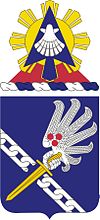188th Glider Infantry Regiment (United States)
| 188th Infantry Regiment | |
|---|---|

188th Infantry Regiment coat of arms.
|
|
| Active | 1942 - 58 |
| Country |
|
| Branch |
|
| Type | Parachute infantry |
| Motto(s) | "Winged Attack" |
| Engagements | World War II |
| Commanders | |
| Notable commanders |
Colonel Robert H. Soule |
| Insignia | |
| Distinctive unit insignia. |  |
| U.S. Infantry Regiments | |
|---|---|
| Previous | Next |
| 187th Infantry Regiment | 196th Infantry Regiment |
The 188th Glider Infantry Regiment was a regiment in the United States Army that was active during World War II. It was a part of the 11th Airborne Division during its entire existence.
The 188th Infantry Regiment was constituted on 12 November 1942 at Camp Mackall, North Carolina. On 25 February 1943, the 188th was activated under the command of Colonel Robert H. Soule. It was designated a glider regiment, and assigned to the 11th Airborne Division. A two battalion regiment, the 188th trained and prepared for combat with its men trained at the end of the war both as gliderists and parachutists. Subsequently, on 4 July 1945 the regiment was redesignated as the 188th Parachute Infantry.
In April, 1944 the 11th was moved to Camp Stoneman, 30 miles (48 km) east of San Francisco, California. The camp processed units for movement overseas. The 11th spent 6 days at the camp being fed extremely well and provided with as much entertainment as possible. One of the tasks at Stoneman was to learn what to do on a ship in case of an attack, and the need to abandon ship. By 11 May the division had sailed on several ships from the port of San Francisco for a 28-day voyage to New Guinea.
The 11th landed as a reserve unit for the Hollandia Operation. Japanese still occupied the island and there was fighting in other parts of the island. Although the 11th had combat alert, they were not committed. By July, 1944 the Japanese had been cut off and isolated in New Guinea. In the meantime Admiral Nimitz's "Island Hopping" had retaken the Solomons, Gilberts, Marshals and Marianas. Between June, 1944 and that September, the 11th had become accustomed to the heat and the jungle conditions. This included jumping into razor sharp Hunai grass. Malaria medication also became a daily routine.
While they there, General MacArthur personally informed General Swing the 11th would be committed to a large operation. He was investigating an airborne assault. New training was centered on jump school and combat in the jungle, with an emphasis on live firing exercises. The entire 11th also had amphibious training whenever possible. General Swing took care of his troops in every way he deemed necessary to improve their survival and morale. His troops would realize after their combat experiences that he trained them hard, and well. He demanded the discipline they would need to survive. Staff and commanders were expected to bolster the welfare and morale of the men whenever possible.
...
Wikipedia
